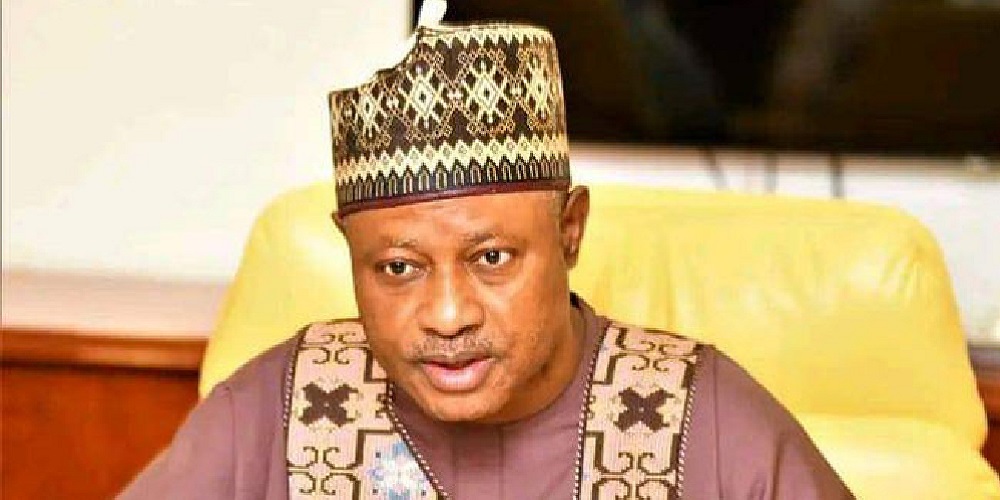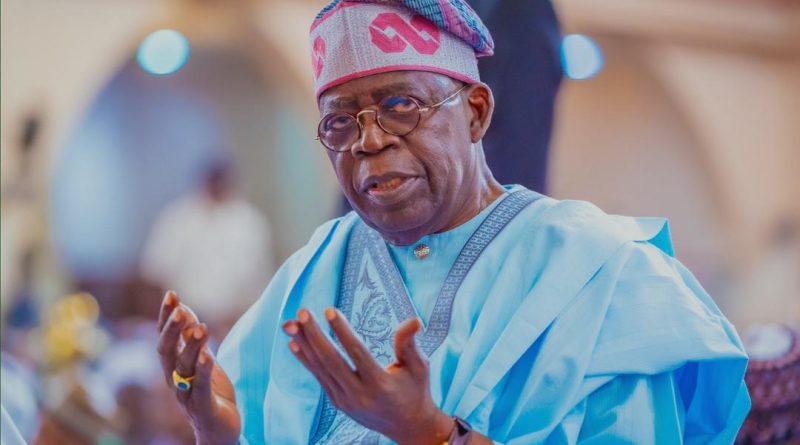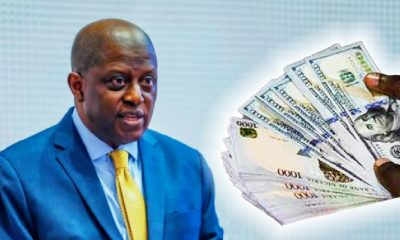News
18 Africans among cardinals to elect new Pope

A total of 18 Africans are among the 135 cardinals eligible to elect the next Pope.
Though there are 252 cardinals, only 135 cardinals have voting status and are eligible to vote for the next Pope when the conclave begins.
Europe has the highest number, with 53 cardinals of voting status.
Asia, with 23, has the next highest number of cardinal electors, followed by Africa with 18 voting members of the College of Cardinals.
South America follows with 17, while North America has 16 cardinal electors.
Oceania and Central America, with four each, have the lowest number of electors at the forthcoming conclave.
The Cardinal electors of African origin are Fridolin Besungu (DR Congo), Ignace Dogbo (Ivory Coast), Stephen Brislin (South Africa), Arlindo Furtado (Cape Verde), Antoine Kambanda (Rwanda), Jean-Pierre Kutwa (Ivory Coast).
Others are John Njue (Kenya), Dieudonne Nzapalainga (Central African Republic), Peter Okpaleke (Nigeria), Nakellentuba Ouedraogo (Burkina Faso), Protase Rugambwa (Tanzania), Robert Sarah (Guinea), Berhaneyesus Souraphiel (Ethiopia).
The list of Africans also includes Desire Tsarahazana (Madagascar), Peter Turkson (Ghana), Jean-Paul Vesco (Algeria), Cristobal Romero (Morocco), Stephen Mulla (South-Sudan).
Interestingly, 108 of the electors were appointed by Pope Francis; 22 by his predecessor, Pope Benedict; and five by Pope John Paul II.
All cardinals under the age of 80 can take part in the secret ballot to be held in the conclave. They need a majority of at least two-thirds plus one to elect the new pope, so the voting can take several rounds spread over numerous days.
The cardinals considered to be the leading candidates to succeed Pope Francis are Peter Erdo (Hungary), Matteo Zuppi (Italy), Robert Sarah (Guinea), Luis Tagle (Filipino), Malcolm Ranjith (Sri Lanka), Pietro Parolin (Italy), Pierattista Pizzaballa (Jerusalem), Fridolin Besungu (Congo), Willem Eijk (Netherlands), Anders Arborelius (Sweden), Charles Bo (Myanmar), Jean-Marc Aveline (France).
More Cardinals have arrived at the Vatican following the death of Pope Francis on Easter Monday.
Approximately 60 cardinals gathered at the Synod hall for the first congregation of the College of Cardinals on Tuesday morning, led by the Camerlengo of the Roman Catholic Church, Cardinal Kevin Farrell.
The Cardinals had at the general congregation, on Tuesday, confirmed Saturday as the date for the funeral of the late Pope.
More Cardinals are billed to participate in the second general congregation scheduled to be held on Wednesday afternoon.
Wednesday morning will be dedicated to the ceremonial transfer of the Pope’s body to the Basilica, where he will lie in state.
Presently, general congregation is being held to discuss the Pope’s funeral but, in the coming days, it will progress to pre-conclave preparatory meetings leading up to conclave itself.
In the coming days, the Cardinals will discuss when the conclave is to start.
Then, they will at their meetings, begin to speak on a variety of matters, such as the present needs of the Church, the state of the Curia and its work, and improving the Curia and the Church’s relation to the world.
Cardinals would swear to maintain rigorous secrecy about all matters in any way related to the election of the Roman pontiff or those which, by their very nature, during the vacancy of the Pope’s seat.
The cardinals then swear collectively an oath, which reads in part: “We promise and swear to observe with the greatest fidelity and with all persons, clerical or lay, secrecy regarding everything that in any way relates to the election of the Roman Pontiff and regarding what occurs in the place of the election, directly or indirectly related to the results of the voting.
“We promise and swear not to break this secret in any way, either during or after the election of the new Pontiff, unless explicit authorization is granted by the same Pontiff; and never to lend support or favour to any interference, opposition or any other form of intervention, whereby secular authorities of whatever order and degree or any group of people or individuals might wish to intervene in the election of the Roman Pontiff.”
After this, each individual, with a hand on the Gospels, pledges his oath to the same.
The cardinal-electors are to refrain from all contact with the outside world during the election: no shared messages, no newspapers, no radio, no television.
Often, the first vote is purely ceremonial, a way for cardinals to honour particular members of the College who, though distinguished, are not considered papable (electable as pope).
From that point on, the voting is scheduled to be two sessions a day, with two rounds of voting per session (four rounds total per day).
The cardinals select three fellow cardinals to count the votes, three others to check the counts, and three, if necessary, to collect ballots from those who, from infirmity, are unable to walk to the high altar.
Each cardinal writes on a ballot the name of his choice for pope, then walks to the high altar.
There, in the painting of the Last Judgment by Michelangelo, he says aloud, “I call as my witness Christ the Lord, who will be my judge, that my vote is given to the one who before God I think should be elected.”
The cardinal then places the ballot into the proper receptacle, bows to the altar, and returns to his place.
Once the ballots have been placed in the receptacle, they are mixed up and then counted aloud.
If the number does not equal that of the electors, the ballots are burned.
If the number is accurate, the ballots are taken out singly, noted by two cardinals, and then announced in a loud, clear voice by a third cardinal.
For a man to be validly elected pope, he must receive two-thirds of the votes.
After each vote, the ballots are burned, and the smoke coming out of the chimney above the Sistine Chapel is black if the vote is inconclusive, and white if a new successor of Peter has been elected.
News
Kaduna gov donates SUVs to monarchs, urges unity, peace

By Francesca Hangeior
Kaduna State Governor, Uba Sani, has praised traditional leaders for their crucial role in maintaining peace and security in the state.
Speaking at an event where 23 vehicles were distributed to traditional leaders, held at the Sir Kashim Ibrahim House, Kaduna, on Sunday, the governor attributed the success of the state’s non-kinetic approach to tackling insecurity to the collaboration between traditional leaders and security agencies.
He emphasised that without the support of traditional leaders, the state would not have achieved security and stability.
“They have been working day and night, sharing intelligence with security agents and ensuring that they are always close to our people at the community level. That is the reason why our non-kinetic approach towards addressing insecurity is working.
“Without the support of our traditional leaders, we would not have achieved security and stability in Kaduna State. That is why today, we are not only supporting but encouraging you,” he said.
The governor commended the Speaker of the House of Representatives, Tajudeen Abbas, for facilitating the distribution of vehicles to traditional leaders.
“This is to motivate you, because we cannot achieve much without synergy between the traditional institution, religious leaders, community leaders, and the relevant security agencies in Kaduna State,” he said.
Sani noted that Kaduna State has been peaceful for the past two years, with no record of ethno-religious or communal clashes. “Kaduna State is now one of the most peaceful sub-nationals in the country,” he said.
The governor highlighted his past achievements as a senator, including bringing interventions worth over ₦20 billion to the state.
Notably, the Faculty of Engineering at Kaduna State University, valued at over ₦12 billion, is nearing completion through the efforts of the Deputy Governor of the Central Bank, Mohammed Sani Abdullahi Dattijo, and Speaker Tajudeen Abbas.
The governor stressed that synergy between government officials and influential figures is crucial for the state’s progress. “That is the synergy we are talking about,” he said, referencing the collaboration on the university project.
“Despite the fact that we couldn’t complete it before we left the Senate, one of the sons of Kaduna State, Deputy Governor of the Central Bank, Mohammed Sani Abdullahi Dattijo, is working closely with the Right Honourable Speaker to ensure that the project is completed. That is the synergy we are talking about,” he added.
Earlier, Speaker Abbas stated that the distribution of vehicles was part of a broader collaboration with the governor to strengthen the role of traditional rulers in peacebuilding and governance.
“These vehicles are not just for ceremonial purposes; they are meant to serve as essential working tools to aid our traditional rulers in reaching every part of their chiefdoms and emirates,” he said.
The Speaker announced plans to extend vehicle support and the renovation of palaces across all three senatorial districts in the state, captured in the 2025 federal budget.
He also disclosed that the ongoing constitution amendment will include provisions to grant traditional rulers a formal role in Nigeria’s governance structure.
“I want to assure you that the National Assembly will do everything humanly possible to carve out a prominent role for our traditional rulers beginning from 2026,” he said.
News
Tech expert caution against sleeping with phone under pillow

By Francesca Hangeior
Technology advisor at TMB Tech, Akin Ibitoye, has issued a stern warning to Nigerians about the health and safety risks of sleeping with mobile devices under their pillows or beside their beds.
Speaking on the Morning Brief on Channels Television on Monday, Ibitoye highlighted the dangers posed by mobile gadgets, ranging from disrupted sleep patterns to potential explosions caused by overheating lithium-ion batteries.
“Do not sleep with your gadget under your pillow. When you sleep with your devices under your pillow, it actually affects you. You don’t know,” Ibitoye cautioned.
According to him, beyond the popular blue light emissions that interfere with the body’s circadian rhythm, an internal biological clock that regulates sleep-wake cycles and other physiological processes over a 24-hour period, influenced by light and other environmental cues, the physical presence of a mobile phone in the bedroom can reduce sleep quality, increase irritability, and in extreme cases, pose safety hazards.
“These gadgets disrupt our circadian rhythm. That’s how, when it’s dark, your body gets the signal it needs to sleep. When you don’t get enough sleep, there are quite a number of things that even the medical practitioners have said could result negatively back to your body,” he explained.
He also raised concerns about the psychological effects of constant connectivity, warning against “doomscrolling”; a habit where users go online for a quick check but end up spending hours.
“We spoke about doomscrolling, where you just want to check Instagram for about five minutes, but you end up spending two hours,” he said.
Ibitoye urged Nigerians to return to using alarm clocks instead of relying on their phones to wake up.
“Before mobile phones, we had alarm clocks. The alarm clock would only sound when the time is right,” he noted, adding that phones attract unnecessary distractions at night with pop-ups and vibrations.
Addressing those who claim they need their phones nearby for work or emergencies, he said, “Unless it’s absolutely tied to your work, you can do without your phone.”
Beyond sleep concerns, Ibitoye warned of physical hazards such as overheating and potential fire risks. He cited past incidents involving phone batteries that exploded due to heat buildup, especially when left under pillows or bedcovers.
“These batteries, lithium-ion batteries, you notice they don’t allow them on airplanes for good reasons. This tiny marvel of technology can explode anytime. If you keep your phone under your pillow, your phone actually gets heated up,” he said.
He referenced a viral video of a woman whose phone exploded while she was making a call.
“Sleeping with your phone or your tablet under your pillow is actually a huge risk that you do not want to take.”
On the subject of radiation, Ibitoye said that even when a phone appears off, it can still send and receive signals.
“These electromagnetic devices being so close, actually affect the electrical signals in our brain,” he explained, urging frequent phone users to opt for wired or wireless earphones and keep phones away from their heads.
For those living in tight spaces or unable to switch off their phones, Ibitoye advised using airplane mode at night.
“If you cannot afford to switch it off, put it in airplane mode. No call will come in, no SMS, no notification, but your alarm will still go off.”
He concluded with a reminder: “As ubiquitous as technology is, it can be harmful to our bodies with extended usage.”
News
Tinubu to meet Gencos over N4tn electricity debt

By Francesca Hangeior
President Bola Tinubu is expected to meet with the leadership of Nigeria’s power-generating companies as part of an emergency effort to address the N4tn debt threatening to cripple the country’s electricity supply chain.
The move follows a high-level meeting on Tuesday between the Minister of Power, Adebayo Adelabu, and chairmen of Gencos in Abuja, amid mounting fears of a possible collapse of the national grid due to liquidity constraints in the sector, according to a statement from the power ministry on Sunday.
The government pledged immediate action to reduce the N4tn debt owed to power generation companies.
Earlier, Gencos had issued a warning to the Federal Government over the continued accumulation of debts now totaling over N4tn.
The companies said they were currently owed N2tn for power supplied in 2024 and N1.9tn in legacy debts.
The statement by the minister’s Special Adviser on Strategic Communications and Media Relations, Bolaji Tunji, stated that the Federal Government had resolved to settle a substantial portion of the debt immediately, while the remainder would be cleared through financial instruments such as promissory notes within the next six months.
He said this would be proposed in a meeting being planned between President Bola Tinubu and the Gencos’ leadership.
“There is a need to pay a substantial amount of the debt in cash. At the minimum, let us pay a substantial amount, then ask for debt instruments in promissory notes to pay the rest,” Adelabu said.
He emphasised the Federal Government’s determination to prevent a collapse of the power sector, describing the situation as a national emergency.
“We recognise the urgency of this matter. The government is committed to resolving this debt to stabilise the sector and prevent further crisis,” he said.
When questioned on a likely date for the meeting, the media aide said, “I can’t say yet,” explaining that discussions were still ongoing among relevant parties.
The Gencos were led by the Chairman of Mainstream Energy Solutions and head of the Association of Power Generating Companies, Col. Sani Bello (retd), who warned that the sector faced a looming collapse due to the mounting debt and persistent liquidity challenges.
Bello noted that the debt burden had crippled operations and limited access to funding for maintenance and infrastructure upgrades. “Without urgent intervention, the entire power ecosystem could collapse,” he said.
Echoing his concerns, the Chairman of Egbin Power and First Independent Power Limited, Kola Adesina, said, “This is a national emergency. Everything hinges on power—industries, homes, hospitals. We cannot afford to let the sector fail.”
Adelabu acknowledged the role of systemic failures and policy inconsistencies in the sector’s woes, adding that the government was not only focused on debt repayment but also committed to pushing reforms that would ease operational challenges.
He advocated for a full liberalisation of the electricity market and called on Nigerians to embrace cost-reflective tariffs, stressing that subsidies were no longer sustainable in the long term. “Citizens must pay the appropriate price for the energy consumed. The Federal Government will continue to provide targeted subsidy for economically disadvantaged Nigerians,” he stated.
-

 News19 hours ago
News19 hours agoVDM: Release my guy now, singer Davido tells EFCC
-

 News18 hours ago
News18 hours agoFormer Plateau deputy governor is dead
-

 Economy9 hours ago
Economy9 hours ago75.5% of rural Nigerians now live below poverty line — World Bank
-

 News9 hours ago
News9 hours agoMassive turnout as Bishop David Abioye holds first service in new church + Video
-

 News24 hours ago
News24 hours agoPolice nab kidnapper after transfer of N70m from victim’s account
-

 News19 hours ago
News19 hours ago“I’m not thinking of a third term agenda -Trump
-

 News9 hours ago
News9 hours agoHow US-Based Yoruba Monarch Died After Brutal Assault In Oyo Palace, Allegedly Ordered By Alaafin Amid Supremacy Row With Ooni Of Ife
-

 Opinion23 hours ago
Opinion23 hours agoCBN 2024 financial performance an indicator Cardoso’s twerking yielding results





